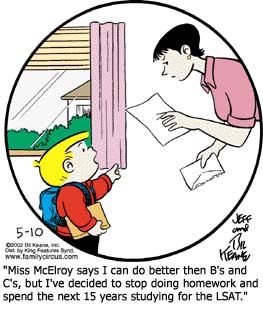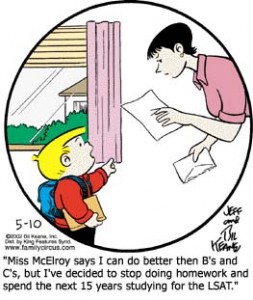Except it’s not what you think. 🙂
So, it is indeed that time of year again – when pre-law students, law school applicants, current law students, and law school admissions officers and administrators anxiously await the new U.S. News & World Report law school rankings. As many of you know, there are rarely any seismic shifts in the results as evidenced by the ever-unchanging, more-certain-than-death-and-taxes Top 14 (“T-14” for those who speak the Law School Admissions dialect) list of fourteen schools always landing in the top, year after year. While subtle movements occur within the Top 14 and elsewhere throughout the rankings list every year – after all, you have to give the readers (and online posters) something to worry/debate/obsess about – I am amazed at how thoroughly predictable the rankings are, by and large. Well, at least I used to be. So in honor of the 2012 rankings being published tomorrow – for more precise timing, the USNWR staff has graciously provided a clock, ticking down the days, hours, minutes, (and yes) seconds until their online publication – here is Top 14 List of what you should keep in mind when the clock strikes zero.
1. In response to a great deal of outside pressures, compelling appeals, and legitimate questions about reliability from myriad constituencies, the 2012 USNWR rankings have apparently been modified in how employment rates are calculated. The details about the specific changes remain nebulous prior to publication, but the issues of transparency and accuracy and the desire to collectively “eliminate some of the gaming that seems to be taking place” all seem to have gained traction. USNWR even wrote a letter to all law school deans, insisting on more honest reporting: http://www.usnews.com/education/blogs/college-rankings-blog/2011/03/09/us-news-urges-law-school-deans-to-improve-employment-data
2. In addition to these improvements in the computations, it seems like USNWR will also make more robust and more detailed career data available than they ever have before to paint a broader, but also more nuanced picture of the current state of the legal market for prospective students. Stay tuned!
3. USNWR recently surveyed law firm recruiters and hiring partners at the top US law firms and created an alternate “Top 25” list, which adds a slightly different perspective to the rankings game: http://www.usnews.com/education/best-graduate-schools/top-law-schools/articles/2011/03/07/law-firm-recruiters-rank-best-law-schools. However, caveat emptor – according to USNWR, the survey “was sent last fall to 750 hiring partners and recruiters at law firms who made the 2010 Best Law Firms rankings produced jointly by U.S. News and the publication Best Lawyers.” And also, “the response rate was 14 percent.”
4. In addition to the overall rankings, don’t forget to review the Law School Specialty rankings as well, particularly if you are interested in attending law school with a specific field/area of interest in mind. Though based solely on votes by legal educators, these are still interesting lists to consider. The specialties listed are: Clinical Training, Dispute Resolution, Environmental Law, Healthcare Law, Intellectual Property Law, International Law, Legal Writing, Part-Time Law, Tax Law, and Trial Advocacy. And guess what schools in the 2010 Specialty Rankings weren’t #1 on any of those lists? I’ll give you a hint, they rhyme with Yale, Harvard, and Stanford.
5. Did you know that 40% of what determines the rankings each year is what USNWR refers to as “Quality Assessment?” Quality Assessment is determined by sending a survey to a variety of constituencies: Peer Assessment (representing 25% of the total rankings) is comprised of law school deans, law school faculty, and deans of academic affairs, while Assessment by Lawyers/Judges (representing 15% of the total ranking) is comprised by law firm hiring partners, selected judges, and other legal professionals. And what does the survey ask? One thing: Please “rate programs on a scale from marginal (1) to outstanding (5).” After that, “a school’s score is the average of all the respondents who rated it,” with “responses of ‘don’t know’ count[ing] neither for nor against a school.” That’s it. That’s 40% of the overall rankings. Even scarier? Last year, for Peer Assessment, only 65% of those surveyed responded… while only 21% of those surveyed for the Assessment by Lawyers/Judges responded.
6. Bar passage rate only accounts for 2% of the total rankings. The main (and only) indicator as to whether or not you will be able to practice law in a given state after graduating from law school accounts for 2% of the law school rankings. And just to reiterate, the one-question survey asking for Peer Assessment accounts for 25%. Just saying.
7. Even the USNWR editors themselves declare that “many other factors that cannot be measured also should figure in your decision, including the course offerings and culture of departments that interest you, the advising or mentoring you can expect to receive, and the location and campus life.” They even explicitly say this: “the rankings can inform your thinking—but they won’t hand you an easy answer. We urge you to use them wisely.” Something to think about, huh?
8. There are many, many other resources for you to consider when researching law schools, even though none of them might have the ticking-down clock (See #9-12).
9. The Law School Admission Council – www.lsac.org
10. The websites (and printed materials) of the individual law schools themselves
11. Our very own Career Services Pre-Law Website – http://www.vpul.upenn.edu/careerservices/gradprof/law/
12. Our very own Career Services pre-law advisors – Anne Reedstom and Yours Truly – available for individual appointments and weekly pre-law walk-in hours
13. Notice that the litany of law school online forums and “boards” is not mentioned here. With very good reason. Please try to refrain for spending time on these websites. They are unregulated, mostly mean-spirited, and often wildly inaccurate and exaggerated. Again, please refer to #9-12 before you ruin your day.
14. And now with my caveats in tow, here you go and happy (judicious, well-reasoned, and non-obsessive… promise?) clicking (since we’re rapidly approaching the zero hour): http://grad-schools.usnews.rankingsandreviews.com/best-graduate-schools/top-law-schools









